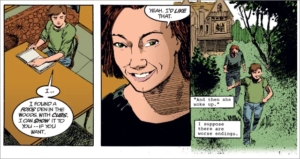Nothing so difficult as a beginning
In poesy, unless perhaps the end.
Quotations about:
ending
Note not all quotations have been tagged, so Search may find additional quotes on this topic.
A bad beginning makes a bad ending.
[κακῆς <ἀπ'> ἀρχῆς γίγνεται τέλος κακόν]
Euripides (485?-406? BC) Greek tragic dramatist
Æolus [Αἴολος], frag. 32 (TGF)
(Source)
Nauck frag. 32. (Source (Greek)). Alternate translation:
A bad ending comes from a bad beginning.
[tr. Collard & Cropp (2008)]
A book is never finished, it is abandoned.
Gene Fowler (1890-1960) American journalist, author, and dramatist. [b. Eugene Devlan]
Quoted in H. Allen Smith, The Life and Legend of Gene Fowler, ch. 27 (1977)
(Source)
It is all right to hold a conversation but you should let go of it now and then.
Richard Armour (1906-1989) American poet and author
(Attributed)
(Source)
Quoted in Herbert V. Prochnow, Speaker’s Handbook of Epigrams and Witticisms (1955). Origin unknown.
KING: All yet seems well, and if it end so meet,
The bitter past, more welcome is the sweet.William Shakespeare (1564-1616) English dramatist and poet
All’s Well That Ends Well, Act 5, sc. 3, l. 378ff (5.3.378-379) (1602?)
(Source)
You can’t go back and change the beginning, but you can start where you are and change the ending.
C. S. Lewis (1898-1963) English writer, literary scholar, lay theologian [Clive Staples Lewis]
(Spurious)
Not found in Lewis' writings, and not considered authentic. There is some similarity to this Lewis quotation. More discussion here:
The beginnings and endings of all human undertakings are untidy: the building of a house, the writing of a novel, the demolition of a bridge, and eminently, the finish of a voyage.
Wars begin when you will, but they do not end when you please.
Niccolò Machiavelli (1469-1527) Italian politician, philosopher, political scientist
Florentine Histories, Book 3, ch. 2 (1521-5)
As commonly given, specific translation unknown. Alt. trans.:
- "It is in the power of any man to begin a war, but he cannot end it when he pleases." [tr. Lester (1843)]
- "People may go to war when they will, but cannot always withdraw when they like." [Bohn's Standard Library (1891)]
- "Wars begin at the will of anyone, but they do not end at anyone's will." [tr. Banield and Mansfield (1988), Book 3, ch. 7]
THE CRONE: Can’t say I’ve ever been too fond of beginnings, myself. Messy little things. Give me a good ending any time. You know where you are with an ending.
Neil Gaiman (b. 1960) British author, screenwriter, fabulist
Sandman, Book 9. The Kindly Ones, # 57 “Chapter 1” (1993-02)
(Source)
As the eldest of the Kindly Ones (Fates, Moirai, etc.), the Crone's task, in the aspect of Atropos, is literally to cut the thread at the end of a life.
ROSE: “And then she woke up.” I suppose there are worse endings.
Neil Gaiman (b. 1960) British author, screenwriter, fabulist
Sandman, Book 2. The Doll’s House, # 16 “Lost Hearts” (1990)
(Source)
There is a time for departure even when there’s no certain place to go.














